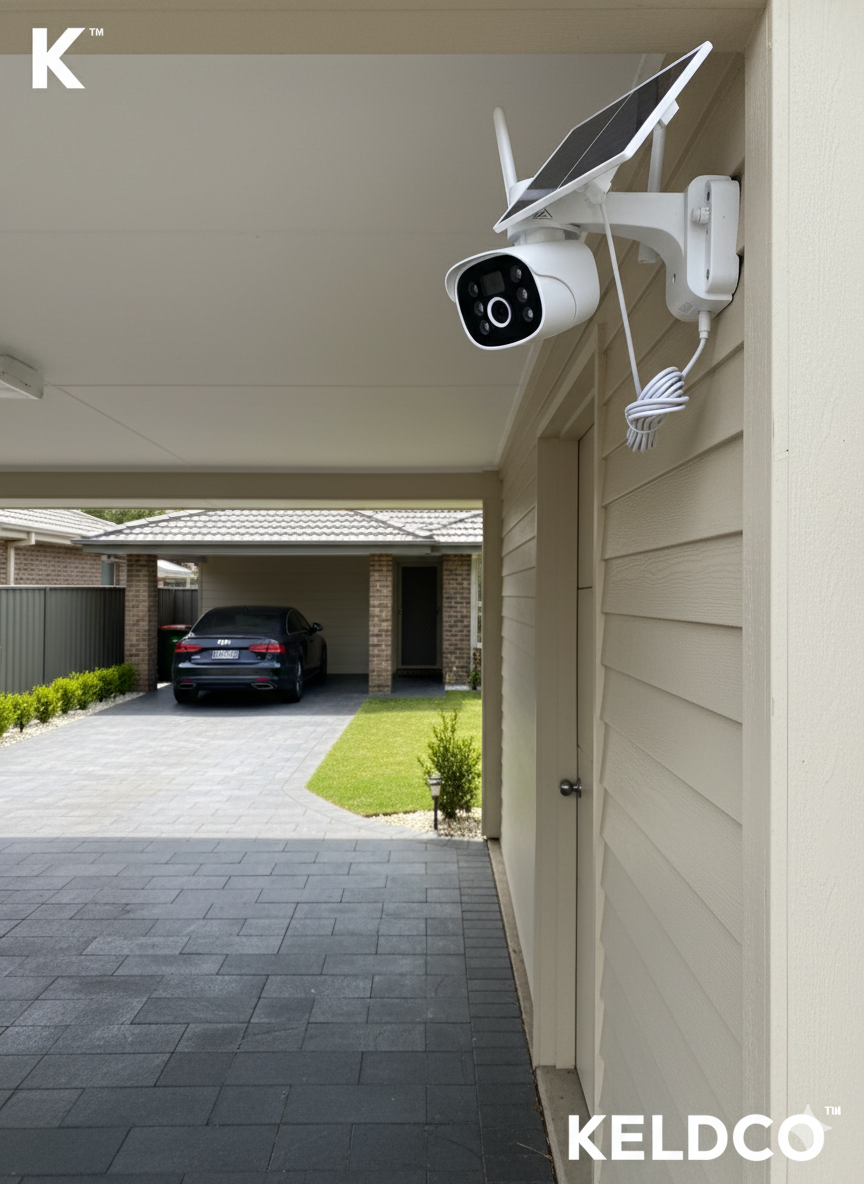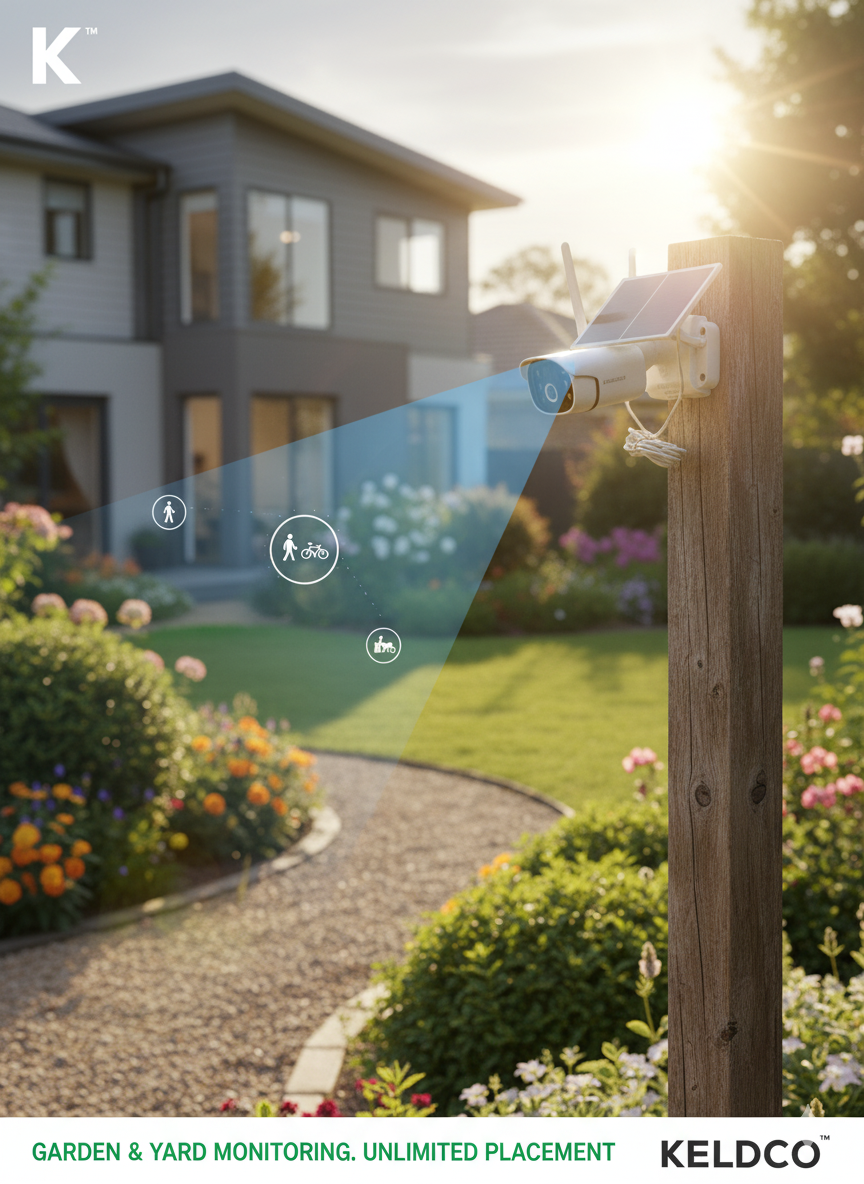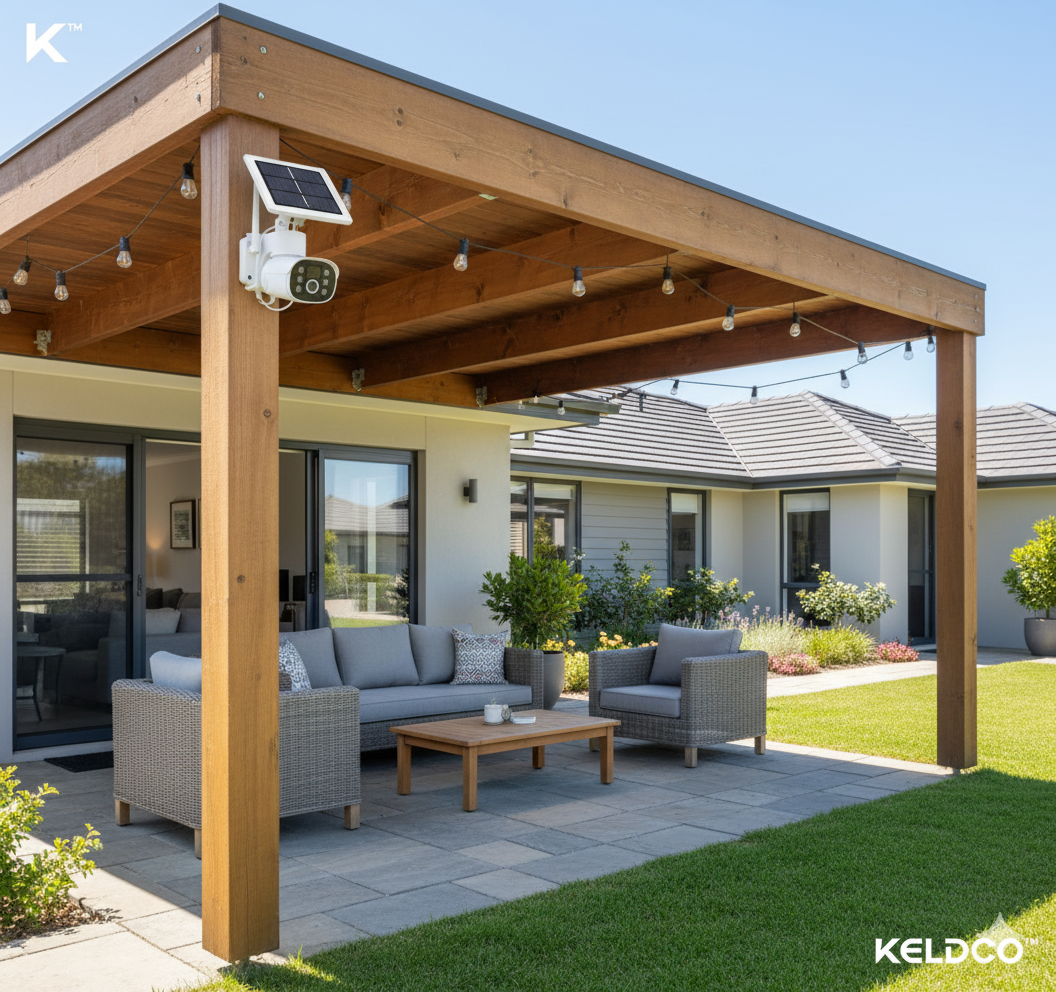Ever wondered what is CCTV security cameras and how they can transform your property's security? These powerful surveillance systems have become essential tools for protecting homes, businesses, and public spaces from theft, vandalism, and unauthorized access.
CCTV (Closed-Circuit Television) security cameras are electronic devices that capture, record, and transmit video footage to help monitor specific areas in real-time. Unlike traditional broadcast television, the signal from these cameras is transmitted to a limited set of monitors, making them perfect for security applications.
In this comprehensive guide, we'll explore everything you need to know about CCTV security cameras, from basic definitions to advanced features, helping you make the right choice for your security needs.
Secure your property with cutting-edge technology. Explore our wifi security camera outdoor collection for reliable wireless protection.
What is CCTV Security Cameras
CCTV security cameras are sophisticated surveillance devices designed to monitor and record activities in specific areas. These systems have evolved significantly since their introduction, becoming more accessible, feature-rich, and user-friendly for both residential and commercial applications.
Understanding what makes CCTV cameras effective starts with knowing their core components and how they work together to provide comprehensive security coverage.
Basic Definition and Purpose
A CCTV security camera system consists of cameras, recording devices, monitors, and connecting cables or wireless transmitters that work together to capture and display video footage. The "closed-circuit" aspect means the video signal is not openly transmitted but sent to specific recording equipment and monitors.
These systems serve multiple purposes including deterring criminal activity, providing evidence for investigations, monitoring employee or family safety, and allowing remote surveillance of property. Modern CCTV systems can integrate with smartphones and computers, enabling users to monitor their property from anywhere in the world.
The primary goal is to create a comprehensive security network that protects people and property while providing peace of mind to users.
How CCTV Systems Differ From Other Security Solutions
CCTV cameras offer unique advantages compared to other security measures:
- Motion Sensors: These detect movement but don't provide visual confirmation of what triggered them.
- Alarm Systems: Alert you to breaches but don't show you what's happening in real-time.
- Security Guards: Provide human oversight but can't monitor multiple locations simultaneously.
- CCTV Cameras: Combine visual monitoring, recording capabilities, and deterrent effects in one system.
CCTV systems provide both proactive deterrence and reactive evidence collection, making them more versatile than single-function security devices. They also offer continuous monitoring capabilities that human security measures can't match.
Key Components of CCTV Systems
Modern CCTV security systems include several essential components that work together:
- Cameras The primary capturing devices, available in various styles including dome, bullet, and PTZ (pan-tilt-zoom) models. Each type serves different monitoring needs and installation requirements.
- Recording Equipment Digital Video Recorders (DVR) for analog systems or Network Video Recorders (NVR) for IP cameras store footage for later review and evidence collection.
- Display Monitors Allow real-time viewing of camera feeds and playback of recorded footage. Many modern systems also support smartphone and tablet viewing.
- Storage Solutions Hard drives, cloud storage, or hybrid systems store video data. Storage capacity determines how long footage can be retained before being overwritten.
- Power Supply Ensures cameras operate continuously. Options include wired power, Power over Ethernet (PoE), and battery or solar-powered solutions for remote locations.
- Types of CCTV Security Cameras
Choosing the right type of CCTV camera depends on your specific security needs, installation location, and desired features. Each type offers distinct advantages for different applications and environments.
Analog vs Digital CCTV Cameras
Analog CCTV Systems use traditional coaxial cables to transmit video signals to recording devices. These systems are typically more affordable and work well for basic security needs. However, they offer lower resolution and fewer advanced features compared to digital systems.
Digital IP Cameras transmit data over internet protocols, providing higher resolution, remote access capabilities, and advanced features like motion detection and email alerts. While initially more expensive, IP cameras offer better long-term value through superior image quality and functionality.
Most modern installations favor digital systems for their flexibility and advanced capabilities, though analog systems remain viable for budget-conscious applications.
Indoor vs Outdoor CCTV Cameras
Indoor Cameras are designed for controlled environments and typically feature smaller, more discreet housings. They focus on clear image quality and may include features like two-way audio for communication.
Outdoor Cameras require weatherproof housing, infrared night vision, and vandal-resistant construction. These cameras must withstand temperature extremes, moisture, and potential tampering attempts.
Key differences include IP ratings for weather resistance, infrared capabilities for low-light conditions, and robust construction materials that can handle harsh environmental conditions.
Wired vs Wireless CCTV Systems
Wired Systems use physical cables for power and data transmission, providing reliable connections and consistent performance. They're ideal for permanent installations where running cables is feasible.
Wireless Systems offer easier installation and flexibility in camera placement. Modern wifi security cameras can connect to existing home networks, eliminating the need for extensive cable runs.
Wireless systems are perfect for renters, temporary installations, or locations where running cables would be difficult or expensive.
Experience hassle-free installation with our solar powered outdoor security camera systems that eliminate power and wiring concerns.
Advanced CCTV Features and Technologies
Modern CCTV security cameras incorporate cutting-edge technologies that enhance their effectiveness and ease of use. These features transform basic surveillance into intelligent security systems.
High-Definition and 4K Resolution
Video quality has improved dramatically with HD and 4K cameras becoming standard offerings. Higher resolution cameras capture finer details, making it easier to identify faces, license plates, and other crucial evidence.
1080p HD cameras provide clear, detailed footage suitable for most security applications. They offer excellent image quality while maintaining reasonable storage requirements.
4K cameras deliver ultra-high resolution with four times the detail of 1080p systems. These cameras excel in applications requiring facial recognition or license plate reading from greater distances.
The trade-off involves larger file sizes requiring more storage space and higher bandwidth for remote viewing, but the improved detail often justifies these requirements.
Night Vision and Infrared Technology
Most security incidents occur in low-light conditions, making night vision capabilities essential for effective surveillance.
Infrared (IR) cameras use infrared LEDs to illuminate areas invisible to the human eye. These systems can capture clear footage in complete darkness up to specific distances.
Color night vision technology uses advanced sensors and processing to maintain color information in low-light conditions, providing more detailed and useful footage than traditional black-and-white night vision.
The effective range varies by camera model, with some systems providing clear night vision up to 100 feet or more from the camera location.
Motion Detection and Smart Alerts
Modern CCTV systems include intelligent motion detection that reduces false alarms while ensuring important events are captured and reported.
Basic motion detection triggers recording when movement is detected within the camera's field of view. Users can adjust sensitivity and create detection zones to minimize false alerts.
AI-powered detection can distinguish between humans, vehicles, and animals, sending specific alerts based on the type of movement detected. This technology dramatically reduces false alarms from moving trees, shadows, or small animals.
Smart notifications can send instant alerts to smartphones or email when specific types of motion are detected, enabling immediate response to potential security threats.
Benefits of Installing CCTV Security Cameras
CCTV security cameras provide numerous advantages that extend beyond basic surveillance, offering comprehensive protection and peace of mind for property owners.
Crime Deterrence and Prevention
Visible security cameras serve as powerful deterrents to criminal activity. Studies show that properties with visible CCTV systems experience significantly fewer break-ins and vandalism incidents.
The psychological effect of knowing they're being recorded often causes potential criminals to choose easier targets without security systems. This preventive aspect makes cameras valuable even when they're not actively monitored.
For businesses, cameras also help prevent internal theft and ensure employees follow proper procedures, creating a more secure and productive work environment.
Evidence Collection and Legal Protection
CCTV footage provides crucial evidence for insurance claims, police investigations, and legal proceedings. High-quality video can identify suspects, establish timelines, and provide clear documentation of events.
Insurance companies often offer discounts for properties with security camera systems, recognizing their value in preventing and documenting claims. This can result in significant long-term savings.
In legal disputes involving property damage or liability issues, video evidence can be decisive in establishing facts and protecting property owners from false claims.
Remote Monitoring and Peace of Mind
Modern CCTV systems allow property owners to monitor their premises from anywhere with internet access. This capability is particularly valuable for frequent travelers or business owners with multiple locations.
Real-time alerts notify users immediately when motion is detected, enabling quick response to potential issues. This instant notification system can prevent minor problems from becoming major security incidents.
Parents can monitor their homes while at work, business owners can check their properties after hours, and vacation homeowners can keep an eye on their properties year-round.
Capture every detail with crystal-clear precision using our 4K outdoor security camera collection for the ultimate in video quality.
Choosing the Right CCTV Security System
Selecting the perfect CCTV system requires careful consideration of your specific security needs, property layout, and budget constraints. The right system balances comprehensive coverage with practical installation and maintenance requirements.
Assessing Your Security Needs
Start by identifying the areas you need to monitor and the types of threats you want to address. Consider entry points, valuable assets, blind spots, and areas with high foot traffic.
Residential users typically focus on doors, windows, driveways, and outdoor spaces. The goal is usually deterring burglars and monitoring package deliveries or visitor activity.
Commercial applications may require more extensive coverage including cash registers, inventory areas, employee work spaces, and parking lots. Compliance requirements may also influence camera placement and recording capabilities.
Document your specific requirements including coverage areas, desired resolution, night vision needs, and any special features like license plate recognition or facial identification.
Budget Considerations and Value
CCTV systems range from basic DIY kits to professional enterprise-grade installations. Understanding the total cost of ownership helps ensure you get the best value for your investment.
Initial costs include cameras, recording equipment, storage devices, and installation fees. Higher-quality components typically cost more upfront but provide better long-term value through improved reliability and features.
Ongoing expenses may include cloud storage fees, maintenance costs, and periodic equipment upgrades. Factor these into your budget planning to avoid unexpected expenses.
Cost vs Features Comparison:
|
Budget Range |
Features |
Best For |
|
$200-500 |
Basic 1080p, limited storage, DIY installation |
Small homes, apartments |
|
$500-1500 |
HD cameras, cloud storage, professional features |
Medium homes, small businesses |
|
$1500+ |
4K resolution, advanced AI, professional installation |
Large properties, commercial use |
Installation and Maintenance Requirements
Consider whether you'll install the system yourself or hire professionals. DIY installation saves money but requires technical knowledge and time investment.
Professional installation ensures optimal camera placement, proper configuration, and reliable performance. Installers can also provide ongoing maintenance and support services.
Maintenance needs vary by system type but typically include cleaning cameras, updating software, checking connections, and replacing components as needed. Plan for these requirements to ensure long-term system reliability.
Factor in your technical comfort level, available time, and the complexity of your desired system when deciding between DIY and professional installation options.
Maintain complete discretion while monitoring your property with our hidden outdoor security camera solutions for covert surveillance.
Final Thoughts on CCTV Security Cameras
CCTV security cameras have evolved into sophisticated protection systems that offer far more than basic surveillance. From deterring criminal activity to providing crucial evidence and enabling remote monitoring, these systems deliver comprehensive security solutions for modern properties.
The key to success lies in choosing the right system for your specific needs, whether that's a basic residential setup or an advanced commercial installation. Consider your coverage requirements, budget constraints, and desired features when making your selection.
Modern CCTV technology continues advancing rapidly, with AI-powered detection, improved night vision, and enhanced connectivity making these systems more effective and user-friendly than ever before. Investing in quality equipment and proper installation ensures you'll benefit from reliable protection for years to come.
Ready to enhance your security setup? Our comprehensive selection of CCTV systems offers solutions for every need and budget, helping you create the perfect security network for your property.
Frequently Asked Questions About CCTV Security Cameras
What does CCTV stand for and how does it work?
CCTV stands for Closed-Circuit Television. It works by capturing video footage through cameras and transmitting it to a limited set of monitors and recording devices rather than broadcasting it publicly. The cameras connect to recording equipment via cables or wireless signals, allowing for real-time monitoring and evidence storage.
How long do CCTV cameras typically record and store footage?
Recording duration depends on storage capacity, video quality, and system settings. Most systems can store 1-4 weeks of continuous footage. Higher resolution cameras and longer retention periods require more storage space. Many modern systems offer cloud storage options for extended retention periods.
Can CCTV cameras work without internet connection?
Yes, traditional CCTV systems can operate without internet using local recording to DVRs or NVRs. However, internet connectivity enables remote viewing, smartphone alerts, and cloud storage. Wireless cameras may require wifi for some features but can still record locally during internet outages.
What is the difference between analog and IP security cameras?
Analog cameras use coaxial cables and provide standard definition video to DVR systems. IP cameras transmit digital signals over network cables or wifi, offering higher resolution, remote access, and advanced features like motion detection and email alerts. IP systems are more flexible but typically cost more initially.
Do security cameras deter crime effectively?
Studies consistently show that visible security cameras significantly reduce crime rates. The deterrent effect works because criminals typically choose easier targets without surveillance systems. Cameras are most effective when clearly visible and part of a comprehensive security strategy including proper lighting and signage.
What features should I look for in outdoor security cameras?
Key outdoor camera features include weatherproof rating (IP65 or higher), night vision capabilities, motion detection, durable construction, and adequate resolution for your monitoring needs. Consider vandal-resistant housing, wide viewing angles, and compatibility with your existing security system for optimal performance.




